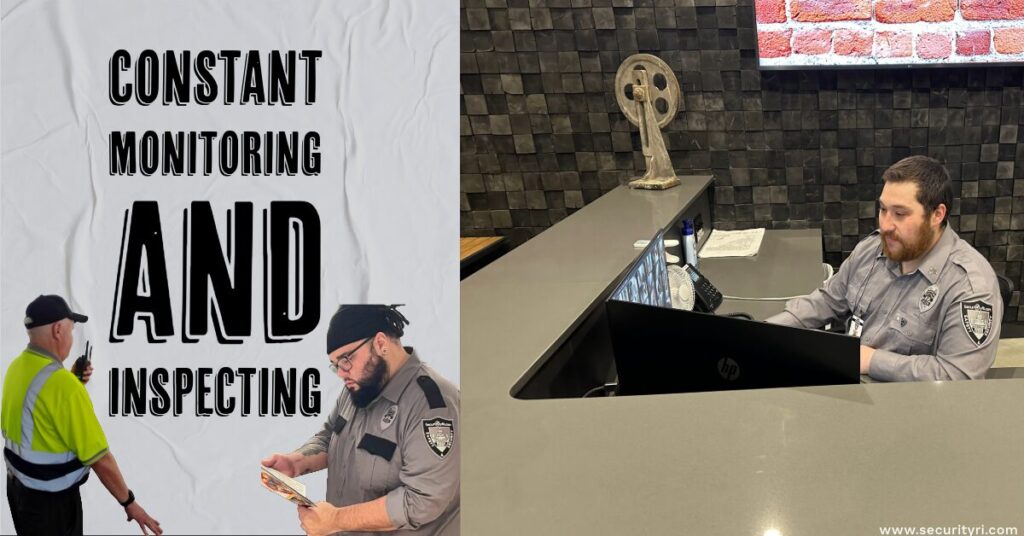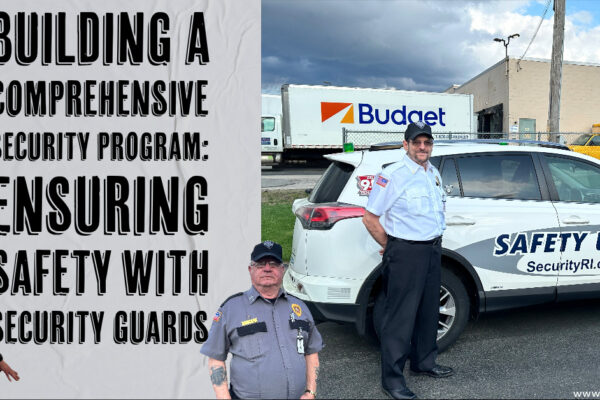Securing Your Site: The Financial Impact of Construction Theft
With construction site theft leading to staggering financial losses—estimated between $300 million and $1 billion annually—securing your site has never been more crucial. Your operation is at risk of being a part of the over 11,000 incidents reported each year in the US and Canada, risking not only immediate capital loss but also the schedule and budget of your projects. As a key stakeholder in Rhode Island’s construction industry, it is imperative to recognize the common targets such as tools, materials, and heavy equipment, and the importance of robust construction security measures.
Understanding the comprehensive impact of theft extends beyond the direct costs. In this article, you’ll discover the far-ranging consequences, including increased insurance premiums, project delays, and the erosion of client trust and relationships that result from inadequate construction security. We’ll navigate you through the financial after-effects and offer proactive strategies tailored to Rhode Island’s construction security landscape, ensuring your site’s safety and your peace of mind.
The Immediate Financial Implications
When a theft occurs on your construction site, the immediate financial implications are both direct and far-reaching. Here’s what you need to consider:
- Direct Costs:
- On average, a single incident of construction theft can cost over $30,000.
- With only 10% of stolen items recovered, the losses add up quickly, impacting your bottom line.
- Downtime Costs:
- The theft of equipment can halt operations for weeks, incurring daily downtime costs between $500-$750 for each fleet vehicle.
- Salaried and hourly workers face lost wages during these periods of inactivity, further increasing the financial strain on your business.
- Secondary Effects:
- Beyond the immediate loss, you may experience construction delays, restricted cash flow, higher operational costs, and slower payments.
- These disruptions can lead to missed deadlines, dissatisfied clients, and strained resources, all of which can have a lasting impact on your company’s financial health.
In Rhode Island, where construction security is of paramount importance, understanding these costs is the first step in safeguarding your site against theft. By recognizing the attractive targets for thieves, such as high-priced equipment with limited regulation and clear identifying features, you can begin to implement measures that not only protect your assets but also preserve your client trust and project timelines. The financial impact of construction theft, which ranges between $300 million to $1 billion annually, underscores the necessity of comprehensive construction security measures to mitigate risk and maintain a positive industry reputation.
Understanding the Downtime Costs
To effectively mitigate the repercussions of construction theft, it is crucial to implement a comprehensive array of preventive measures. These include:
- Physical Security Reinforcement: Reinforcing your Rhode Island construction site with physical barriers, surveillance cameras, and lighting can deter theft and unauthorized access.
- Employee Training Programs: Educating your workforce on the importance of security protocols and vigilance can significantly reduce the risk of theft and enhance overall site safety.
- Inventory Management Systems: Adopting advanced inventory management can help you keep track of materials and equipment, ensuring that any irregularities are spotted quickly.
- Industry Associations: Collaborating with industry associations can provide valuable insights into the best practices for construction security, keeping you abreast of the latest trends and technologies.
- GPS Tracking Technology: Utilizing GPS tracking for your equipment can serve as both a deterrent to potential thieves and a means to recover stolen items.
By incorporating these strategies, you not only safeguard your assets but also protect your project from the financial losses and project delays that theft can cause. Furthermore, it helps in maintaining lower insurance premiums and ensuring the safety of your workers, which is paramount. Remember, the costs associated with theft are not just immediate; they can have long-term effects on your business and reputation. Take action to prevent construction theft and secure the success of your projects in Rhode Island by implementing these proactive measures.
Impacts on Insurance and Security Measures
In the face of construction theft, insurers may respond by hiking premiums or, in severe cases, canceling policies if they perceive a site as inadequately protected. This can significantly add to your financial burden, with unplanned downtime due to theft potentially damaging client relationships, leading to costly lawsuits, and tarnishing your company’s reputation. To combat this, consider the following measures:
- Insurance and Security Integration:
- Ensure sufficient insurance coverage to protect against the financial consequences of theft.
- Incorporate immediate notification systems, such as GPS tracking, to alert you when equipment leaves a geofenced area, aiding in swift recovery.
- Proactive Prevention Strategies:
- Implement multi-layered security, including perimeter security, access control, and video surveillance.
- Utilize high-tech protection systems from companies like Hilti and DEWALT, offering key-activated tools and tracking devices.
- Strengthening Physical Security:
- Secure valuable equipment with locks, alarm solutions, and tracking solutions like GPS and RFID.
- Ensure your Rhode Island construction sites are well-lit, fenced, and guarded, especially during off-hours.
By taking these steps, you not only safeguard your assets but also demonstrate to insurers a commitment to construction security, which can help maintain reasonable insurance rates and uphold the trust of your clients.
The Ripple Effect on Client Trust and Relationships
In the wake of construction site theft, the repercussions extend far beyond immediate financial losses, permeating the very fabric of client trust and relationships. Your ability to deliver on promises is paramount in Rhode Island’s competitive construction landscape, and any disruption can have a lasting impact.
- Vandalism and Repair Costs: Intruders often leave a trail of vandalism in their wake, necessitating unforeseen repair costs. This not only stretches your financial resources but can also lead to operational delays. Such incidents can strain the professional bond you’ve nurtured with clients and stakeholders, as they may perceive these setbacks as a reflection of your management capabilities.
- Trust in the Industry: The construction sector thrives on the bedrock of trust and collaboration. Yet, improvement in these areas is often a gradual process. Contractors are hopeful for a future where trust is strengthened, but the path to such improvement is a slow one, as noted in a Construction Dive report. Your commitment to robust construction security can be a catalyst for accelerating this trust-building process.
Embedding a culture of security and demonstrating proactive measures in safeguarding assets can significantly uplift your reputation. By prioritizing construction security, you not only protect your financial interests but also reinforce the confidence clients place in your services, ensuring that your professional relationships in Rhode Island remain unshaken by the threat of construction site theft.

Proactive Strategies to Minimize Risk
In the realm of construction security, especially within Rhode Island, the implementation of proactive strategies is not just beneficial but essential to minimize the risk of theft. Here are some best practices to integrate into your security plan:
- Implement Strict Access Controls: Ensure that only authorized personnel can enter the site. Use ID badges, biometric scanners, or key codes to control access.
- Surveillance and Lighting: Install surveillance cameras and security lighting strategically to cover all areas of the site. This not only deters thieves but also helps in identifying them should an incident occur.
- Asset Tracking and Management:
- Utilize tracking devices on high-value assets for real-time location monitoring.
- Conduct regular equipment inventory to keep track of all materials and equipment.
- Mark and register your equipment to aid in recovery if stolen.
- Training and Vigilance:
- Educate workers about the importance of site security and theft prevention techniques.
- Encourage a culture of vigilance and responsibility among all site personnel.
- Material Management:
- Arrange for materials to arrive only when needed and ensure they are securely stored.
- Keep high-value tools and materials locked in secure storage containers when not in use.
- Community Engagement:
- Introduce yourself to neighbors and provide contact information for reporting suspicious activities.
- Consider a security service for large sites or extensive inventories.
By adopting these proactive measures, you can significantly reduce the likelihood of construction theft and maintain a secure environment for your Rhode Island construction projects. Remember, a robust security plan not only protects your assets but also reinforces the confidence clients have in your ability to deliver secure and successful projects.
Conclusion
Throughout the discourse, we have comprehensively explored the multifaceted financial repercussions of construction theft—a pervasive issue that deeply affects Rhode Island’s construction sector. From the staggering immediate costs to the subtle erosion of trust with clients, the reasons for bolstering construction site security are both compelling and urgent. Demonstrated through the outlined strategies, the importance of vigilance and a well-structured defense against these risks is clear, and the steps you take today can secure not only your assets but also the future of your company’s reputation and client relationships.
Despite the challenges posed by construction site theft, the path to a more secure operation is achievable when proactive measures are adopted and fully integrated into daily operations. Should you wish to further strengthen your site’s defenses, consider reaching out to SecurityRI for a Free Security Assessment, ensuring you take every possible step toward preventing loss and enhancing your project’s success. With the right approach, you can fortify your site against theft and build a more resilient, trustworthy business in the process.
FAQs
How can construction site security be enhanced?
To enhance construction site security, it is important to:
- Improve lighting to deter criminals who prefer operating in darkness.
- Develop a security plan that everyone on site is aware of and agrees to follow.
- Secure the site’s perimeter to prevent unauthorized entry.
- Implement controlled access points to monitor who enters and leaves the site.
- Be flexible and adapt security measures to accommodate changes in the construction site.
- Remove valuables that are not needed to minimize theft temptation.
- Continuously monitor the site, possibly with security personnel or surveillance equipment.
What strategies can be employed to prevent unauthorized access to construction sites?
To prevent unauthorized access to construction sites, employ the following strategies: - Install perimeter fencing as the primary barrier against intruders.
- Consider additional localized fencing where necessary.
- Regularly remove access ladders or secure them with locks or covers to prevent their use.
- Be vigilant as unauthorized access often results in falls from height, which can have serious consequences.
What measures should be taken to secure belongings from theft?
To secure your belongings from theft, always practice the following: - Lock doors and windows whenever you leave your room or office, even if it’s just for a short period.
- Do not prop doors open or disable their locking mechanisms.
- Never leave personal items like purses, wallets, bags, laptops, phones, or earbuds unattended in public spaces, not even momentarily.
What steps can be taken to deter or prevent theft within a business?
To deter or prevent theft within a business, consider these actions: - Get to know your employees and be aware of potential theft indicators.
- Supervise employees closely to discourage theft.
- Implement the use of purchase orders to track transactions.
- Control cash receipts and ensure proper handling of money.
- Conduct informal audits to check for discrepancies.
- Set up computer security measures to protect digital assets.
- Monitor business checks to prevent fraudulent use.
- Manage inventory effectively and consider the use of security systems to protect assets.








